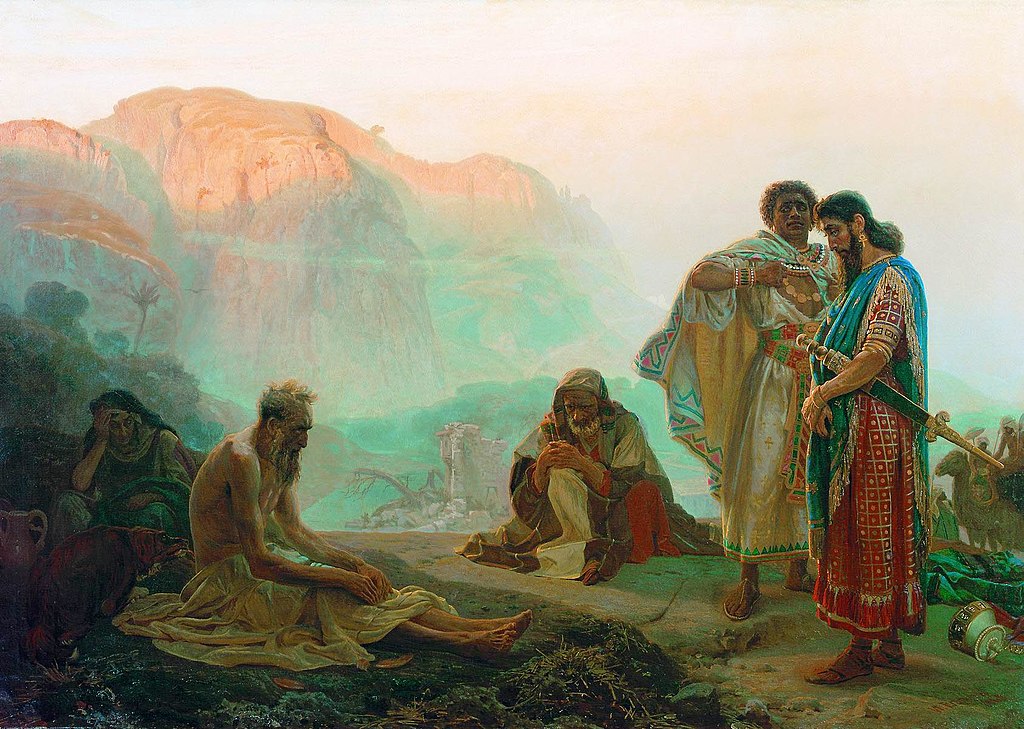“If God is unable to prevent evil, then he is not all-powerful. If God is not willing to prevent evil, then he is not all-good. If God is both willing and able to prevent evil, then why does evil exist?” – Epicurean Trilemma.
Job’s friends leave their homes and peace to commiserate with their friend who has been visited with misfortune. Job wants to know why his day turned to the darkest of nights all of a sudden. Job does not direct his questions at his friends. His beef is with his maker, to whom Job directs not just his pain, but also his consternation. He asks:
“What is man, that thou shouldest magnify him? and that thou shouldest set thine heart upon him? And that thou shouldest visit him every morning, and try him every moment?”[1] Job 7:17-18

Job’s friends throw themselves into the fray. They praise and deck God in the most glorious and wonderful robes. They craft their psalms on divine providence for all of nature and fawn on God’s love and care for the poor and his disdain for the powerful and haughty. They ascribe judgement and righteousness to God whose ways are mysterious and unsearchable,[2]Job 5:9 and then go on to explain and justify God’s mysterious and unsearchable ways. In their advocacy for God they conclude that Job deserves every bit of his misfortune and a lot worse than he is suffering! In the words of Eliphaz the Temanite:
“Remember, I pray thee, who ever perished, being innocent? or where were the righteous cut off?” [3]Job 4:7
So how dare Job impugn the righteousness of God?
Thank goodness, scripture gives us a privileged seat at this theatre and a prologue to the entire shebang. Job does not suffer because of sin, he is summonsed to justify God’s faith in his integrity. And in the epilogue we learn that God is displeased with Job’s friends and their fawning on God:
“The LORD said to Eliphaz the Temanite, My wrath is kindled against thee, and against thy two friends: for ye have not spoken of me the thing that is right, as my servant Job hath.” [4]Job 42:5
Let’s drill that down a little. God condemns those who defend Him and describes their words of praise and declarations of the righteousness of God as “not right”. But the Most High justifies Job who rails at the divine injustice of his predicament.
God condemns those who defend Him and describes their words of praise and declarations of the righteousness of God as “not right”.
Now that’s not altogether a revelation. In an exchange between God and Satan, God says as much:
“And the LORD said unto Satan, Hast thou considered my servant Job, that there is none like him in the earth, a perfect and an upright man, one that feareth God, and escheweth evil? and still he holdeth fast his integrity, although thou movedst me against him, to destroy him without cause.”[5]Job 2:3
That’s the trouble with Theodicy. God does not want you defending him on matters beyond your spiritual and cognitive capability. He does not care for folks “darkening counsel by words without knowledge”.[6]Job 38:2
If God did not tell you the cause of any experience, keep your opinions to yourself – quod erat demonstrandum.
Have you ever approached your priest with questions about the prosperity of the wicked and the struggles of the righteous or evil in the world of a good and omnipotent God; children who die in infancy or the dilemma of victims of gang rape who fall pregnant as a result? How often does he or she say simply: I don’t have the answer?
Has the anointed of God ever taught on the unsearchable and mysterious nature of God and then go on to explain and justify every act of the unsearchable and mysterious God?
Did your pastor ever admit to not having an answer to any questions about the righteousness of God in the face of rampant evil in a world over which God presides? Do you as a person of faith feel that it’s your calling and duty to defend God when His divine prerogatives are called to question? Do you instinctively justify God despite not having all the answers or believe that there ought to be no questions, but for that liar, the devil, doing a sport of rabblerousing?
Theodicy – a justification of the existence of evil and suffering in the world or a discourse justifying the ways of God.
The late Rabbi Emeritus Jonathan Sacks once wrote that scripture is full of difficult texts, what’s lacking are competent teachers. I came across one such text in my daily scripture reading and went in search of teachers. What I found was mostly stuff that God had taught us to avoid: Theodicy – a justification of the existence of evil and suffering in the world or a discourse justifying the ways of God.
First the scripture. Psalm 105 waxes lyrical about divine providence for Israel, despite Israel’s unfaithfulness. Then it goes on to suggest that God manipulated the Egyptians to oppress the Jews. In the words of the Psalmist:
“He turned their heart to hate his people, to deal subtilly with his servants.”[7]Psalm 105:25
He turned their hearts!?!
Lest we forget, it wasn’t simply an experience of hatred that caused a loss of a job opportunity or led to your privileges in the echelons of government to be rescinded. It wasn’t about your children not receiving invitations to their neighbour’s children’s birthday parties or your daughter missing out on a prom date. It was hatred that led to mass infanticide, hundreds, maybe thousands of children were thrown into the Nile!
I went online to see what others make of this text. After scrolling through pages I fail to find a single contributor who regards this as a difficult text. Most commentaries conclude that because God is innately good, God does not do what the Psalmist appears to suggest that God does. Most believe that God’s goodness towards Israel brought out the beast in the Egyptians. None admit to not having an answer. No one says: “This is beyond me”.
Our shared humanity should lead us to feel the pain of others, whatever our presumptions.
That’s where a number of the ancients differ from us. As a prophet of God, Ezekiel had enough revelation to cause him to be certain who God was and what God might do or choose to not do. In his vision of the valley of dry bones, God asks him:
“Son of man, can these bones live?”
Ezekiel does not go on a praise of the omnipotent, indefatigable God of all possibilities. Rather, he says:
“Oh Lord God, thou knowest.”[8]Ezekiel 37:3
That is humility in someone who’s as filled with the Holy Spirit as any.
Moses had close encounters with the divine throughout his ministry. There was the burning bush and the smoking mountain, the cloud that attended his visits to the tabernacle and even a glimpse of the back of the angel of His presence, but despite these privileged encounters, he was humble enough to admit that there were things we would never know or understand. In his words:
“The secret things belong unto the LORD our God: but those things which are revealed belong unto us and to our children for ever, that we may do all the words of this law.”[9]Deuteronomy 29:29
That’s a good reason Moses was considered the most humble person of his time.[10]Numbers 12:3
The late Rabbi Emeritus Jonathan Sacks once wrote that scripture is full of difficult texts, what’s lacking are competent teachers.
It is what makes Ecclesiastes one of the most unpretentious and authentic explorations of the mysteries of life. The Preacher does not deny the righteousness of God or the divine prerogative to do as God pleases. He does not offer glib solutions to the questions that life asks. While insisting on our duty to fear God and obey His commandments, the tension between received wisdom and everyday experience makes his book the most melancholic but humble of the books of the Bible. In his treatise on saints and sinners, he wrote:
“All things have I seen in the days of my vanity: there is a just man that perisheth in his righteousness, and there is a wicked man that prolongeth his life in his wickedness.”[11]Ecclesiastes 7:15
The truth is we don’t know why fate is so ordained. We don’t know as much as we wish we did. We don’t know as much as we make out. Life in all its complexity has devoured a lot of Jobs. And in our rush to justify God most of us shoot our mouths off with the pomposity of ignoramuses. We have rubbed chilli on a lot of wounds and in our judgements, we have condemned innocent souls. It’s a mark of humility to be circumspect in handling of Holy texts. Above all, our shared humanity should lead us to feel the pain of others, whatever our presumptions. As the Lord Jesus Christ said:
“He that is without sin among you, let him cast the first stone….”
As the Preacher would say, now let us hear the end of the matter, fear God and on matters concerning which you have no revelation, keep quiet, for God will bring all matters into judgement, including sanctimonious presumptions.


